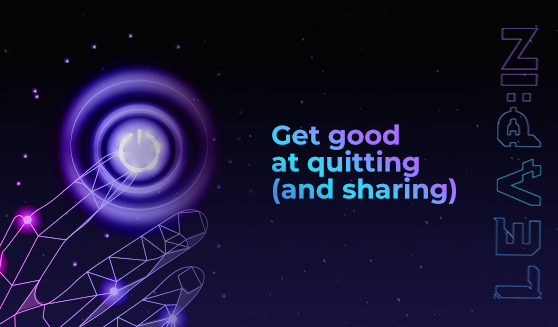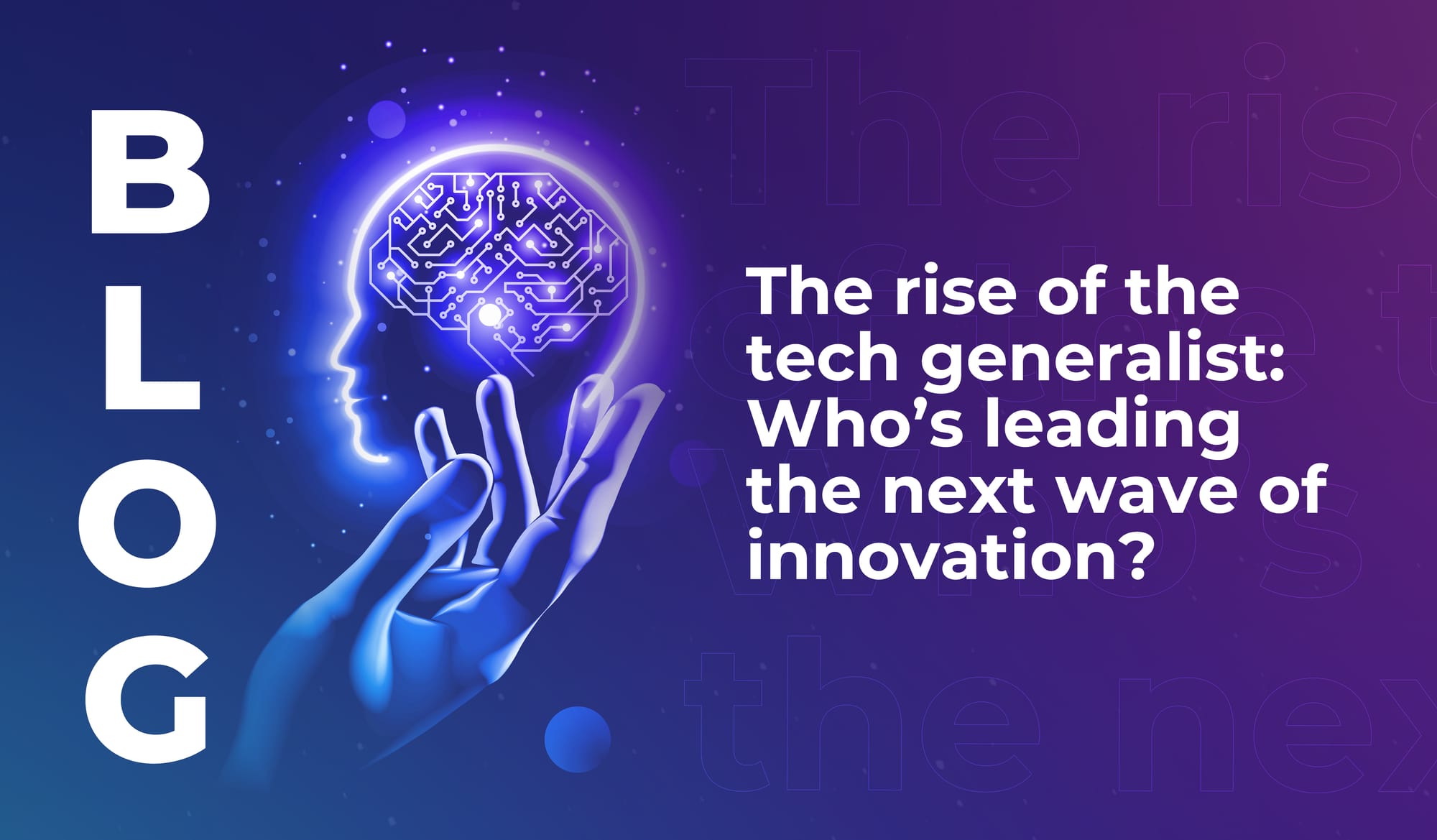
Tech careers with impact: The power of investing
If you’ve ever thought about becoming a tech investor, read this – learn why investors are the quiet force shaping the future of the industry.


Welcome to this week’s LEAP:IN newsletter. Each week, we unpack leader’s powerful quotes and decipher the tech landscape. With exclusive content from some of the world’s leading experts in AI, robotics, space, edutech, climate tech and more, read on to discover this week’s insights and subscribe to receive weekly updates direct to your inbox.
This week we’re quoting…
Steven Bartlett (Founder of Social Chain, author of Happy Sexy Millionaire and the youngest Dragon on BBC’s Dragons’ Den)
What Bartlett said:
“I’m a very good quitter. I quit with a real sense of internal peace and without much procrastination. And I think people don’t talk about that enough because we glamorise starting as the be-all-and-end-all, but the very important thing you have to do before you start anything in life is quit something else. And so being a fast, high-conviction quitter I think is very important.”
Are other tech innovators big on quitting?
Yes. Here are some examples:
– Elon Musk founded Zip2 in 1995, providing maps and business directories to online newspapers. In 1999 he decided to move on. He sold Zip2 to computer manufacturer Compaq for $307 million and then went on to bigger and better things — specifically, founding financial services company X.com which later became PayPal.
– Twitter co-founder and CEO Jack Dorsey left the company last year. Although there’s been some speculation about the true reasons for his resignation, his future focus is clear: bitcoin.
– Crypto billionaire Joseph Lubin worked in electrical engineering and in the music industry before he quit and turned to bitcoin in 2009, and then co-founded Ethereum with Vitalik Buterin in 2014.
– Cybersecurity innovator Martin Roesch sold his company, Sourcefire, to Cisco in 2013 for $2.7 billion. He went on to become CEO of Netography, which raised $45 million in Series A funding in Q4 2021, just after his arrival on the scene.
The list could go on. And on. But our point is that Bartlett isn’t the only one who values the art of quitting. Some of the most successful names in the tech industry have built successful companies and then moved on — because knowing when to quit is as important as knowing when to persevere.
Fish can teach us something about quitting. Yes, really
A study led by Misha Ahrens at the Howard Hughes Medical Institute (Maryland, US) tested out behaviour change processes on zebrafish. They controlled what the fish were seeing by creating a kind of underwater VR experience, surrounding the fish with screens.
They played video to make the fish think they were moving backwards, when they were actually swimming forwards. And after repeatedly trying to go forwards, the fish suddenly stopped swimming. They gave up.
The researchers imaged the brains of the fish to measure cell activity. What they discovered was that the non-neuronal cells, called ‘glia’, demonstrated more activity and diversity than expected — and it was one type of glia, called ‘astrocytes’, that were activated when the fish gave up and entered a passive state.
Just before the fish gave up, astrocytes in a specific area of the brain lit up.
Why is this interesting? Because the scientists had expected neurons, not non-neuronal cells, to be responsible for behaviour change. “We were excited and also very sceptical,” Ahrens said in a press release.
So they did six more experiments, including one in which they used a laser to wipe astrocytes from the fish brains. And when they did that, the fish kept on trying to swim — without those non-neuronal cells they lost their ability to give up.
What (other) science says
A study by psychologists Gregory Miller and Carsten Wroshch in 2007 found that quitting might actually be good for your health. People who felt comfortable with quitting had better mental and physical health than people who force themselves to persevere when something’s no longer working for them.
Researchers from the USC Institute for Creative Technologies cautioned that although perseverance has its benefits, ‘gritty’ individuals should learn when to quit. In a 2015 study focused on university students, ‘grit’ was found to be a trait that sometimes sets you up for failure — because instead of cutting your losses and moving onto a better opportunity, you risk getting stuck on one doomed project. Forever.
If you find it difficult to quit, read this 2018 report called The Neuroscience of Goals and Behavior Change, by Elliot Berkman (Professor and Managing Director of the Center for Translational Neuroscience). You’ll learn about how to increase neuroplasticity and make space in your brain to give up on the things that aren’t working, and pursue the things that are. Clue: both motivation and cognitive processes play a role in your capacity for quitting.
Did you quit?
We’d love to know if you’ve walked away from an idea or a business and felt good about it. Tell us on @LEAPandinnovate.
And…
Eva Fyrberg (Global Head & Ericsson 5G Alliance at KPMG)
What Fyrberg said:
“Daring to share and being willing to collaborate is one of the key aspects of innovation.”
100% agree.
And as well as collaborations between tech developers (made easier by events like LEAP23, of course) we love to see collaborations between people and technology. When people are excited by the possibilities of tech, they drive the development of good tech experiences because they share their opinions, their needs; their data.
Things that happen when companies can access detailed consumer data:
– Netflix gathers watching data, down to the second that a user pauses a scene. They know user watching habits and preferences so well that the success rate of Netflix series is 70%, compared to less than 35% for traditional TV.
– Dr. Aisha Bin Bishr (Assistant General Director at the Smart Dubai Office) launched the Happiness Meter, a real-time data system enabling residents to express their satisfaction levels at touchpoints throughout Dubai, to feed into the Happiness Index — which currently shows that Dubai and Abu Dhabi are the happiest cities in the region.
– We know Spotify hasn’t been in everyone’s good books lately, but its use of big data is pretty inspiring. And as well as streamlining the listener experience, the company’s Spotify for Artists platform gives artists access to data about the way users listen to their music, so they can feed that back into their own marketing and creative processes.
Now is the time to boost public trust in data sharing
Why? Because data is the quickest, most effective way for people to collaborate with tech developers and ensure that future technology actually meets their needs.
And also because people are sharing data all the time, whether they feel good about it or not:
– There are more than 3.5 billion daily searches on Google (source: Internet Live Stats)
– WhatsApp users exchange 65 billion messages every day (in 180 countries and at least 60 languages) (source: Connectiva Systems)
– In 2020, every person generated 1.7 megabytes per second (source: IBM)
– 80-90% of data generated right now is unstructured (making it hard to draw high quality insights) (source: CIO)
– Right now it would take around 181 million years to download all the data from the internet (source: Unico)
So we want people to understand and leverage their own data interactions in a way that shapes the future to their advantage.
And, as Fyrberg said, to make smart cities work for the citizens who live in them.

If you’ve ever thought about becoming a tech investor, read this – learn why investors are the quiet force shaping the future of the industry.

Tech generalists will enable emerging technologies to integrate across industries and societies in meaningful ways. We still need specialists – but we also need big-picture people.

Discover three tech sectors facing a talent shortage this year. Could you find your ideal role in a high-demand sector like cybersecurity, cloud computing, or artificial intelligence?

If you’ve ever thought about becoming a tech investor, read this – learn why investors are the quiet force shaping the future of the industry.

Tech generalists will enable emerging technologies to integrate across industries and societies in meaningful ways. We still need specialists – but we also need big-picture people.

Discover three tech sectors facing a talent shortage this year. Could you find your ideal role in a high-demand sector like cybersecurity, cloud computing, or artificial intelligence?